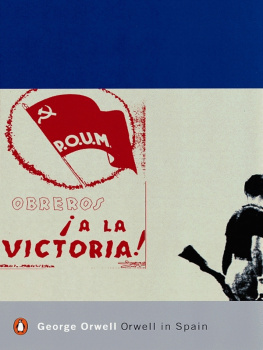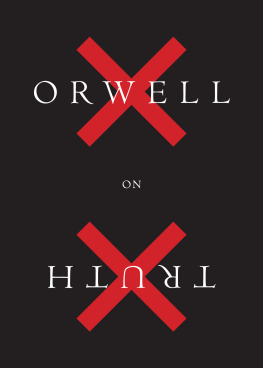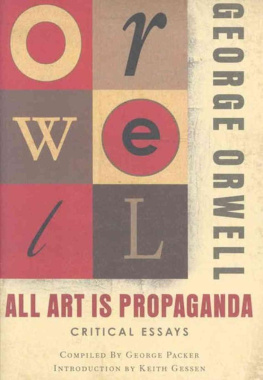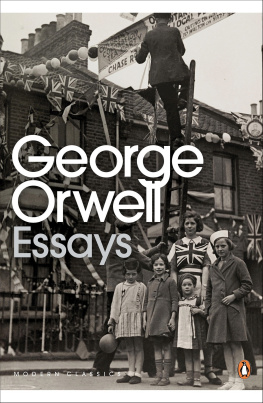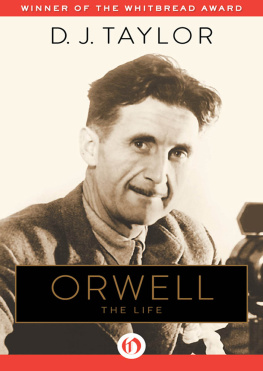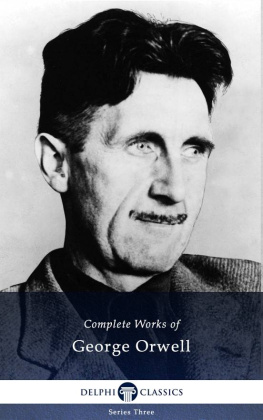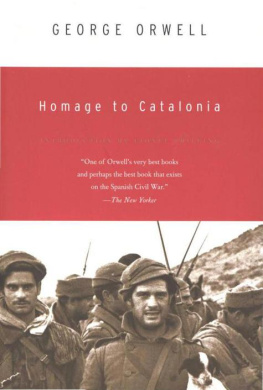
Orwell in Spain
The Full Text of Homage to Catalonia with Associated Articles,
Reviews and Letters from The Complete Works of George Orwell
Edited by Peter Davison
Introduction by Christopher Hitchens

PENGUIN BOOKS
Contents
PENGUIN BOOKS
Orwell in Spain
One of the most influential English writers of the twentieth century Robert McCrum, Observer
A prophet who thought the unthinkable and spoke the unspeakable, even when it offended conventional thought Peter Grosvenor, Daily Express
He saw through everything because he could also see through himself. Many writers and journalists have tried to imitate his particular kind of clarity without possessing anything like his moral authority Peter Ackroyd, The Times
Orwells innocent eye was often devastatingly perceptive a man who looked at his world with wonder and wrote down exactly what he saw, in admirable prose John Mortimer, Evening Standard
Matchlessly sharp and fresh The clearest and most compelling English prose style this century John Carey, Sunday Times
It is impossible not to be elated by his literary and political writing and enraged by what he was up against the most lovable of writers, someone whose books can make the reader long for his company Geoffrey Wheatcroft, Spectator
His intellectual honesty was a virtue it wasnt just the amount of truth he told but the way he told it, in prose transmuted to poetry by the pressure of his dedication Clive James, New Yorker
The finest English essayist of his century He made it his business to tell the truth at a time when many contemporaries believed that history had ordained the lie His work endures, as lucid and vigorous as the day it was written Paul Gray, Time
ERIC ARTHUR BLAIR (George Orwell) was born in 1903 in India, where his father worked for the Civil Service. The family moved to England in 1907 and in 1917 Orwell entered Eton, where he contributed regularly to the various college magazines. From 1922 to 1927 he served with the Indian Imperial Police Force in Burma, an experience that inspired his first novel, Burmese Days (1934). Several years of poverty followed. He lived in Paris for two years before returning to England, where he worked successively as a private tutor, schoolteacher and bookshop assistant, and contributed reviews and articles to a number of periodicals. Down and Out in Paris and London was published in 1933. In 1936 he was commissioned by Victor Gollancz to visit areas of mass unemployment in Lancashire and Yorkshire, and The Road to Wigan Pier (1937) is a powerful description of the poverty he saw there. At the end of 1936 Orwell went to Spain to fight for the Republicans and was wounded. Homage to Catalonia is his account of the civil war. He was admitted to a sanatorium in 1938 and from then on was never fully fit. He spent six months in Morocco and there wrote Coming Up for Air. During the Second World War he served in the Home Guard and worked for the BBC Eastern Service from 1941 to 1943. As literary editor of Tribune he contributed a regular page of political and literary commentary, and he also wrote for the Observer and later for the Manchester Evening News. His unique political allegory, Animal Farm, was published in 1945, and it was this novel, together with Nineteen Eighty-Four (1949), which brought him world-wide fame.
George Orwell died in London in January 1950. A few days before, Desmond MacCarthy had sent him a message of greeting in which he wrote: You have made an indelible mark on English literature you are among the few memorable writers of your generation.
PETER DAVISON is Research Professor of English at De Montfort University, Leicester. He was born in Newcastle upon Tyne in 1926 and studied for a London External BA (1954) by correspondence course. He edited an Elizabethan text for a London MA (1957) and then taught at Sydney University, where he gained a Ph.D. He was awarded a D.Litt. and an Hon. D. Arts by De Montfort University in 1999. He has written and edited fifteen books as well as the Facsimile Edition of the manuscript of Nineteen Eighty-Four and the twenty volumes of Orwells Complete Works (with Ian Angus and Sheila Davison). He is a Past-President of the Bibliographical Society, whose journal he edited for twelve years. He was made an OBE in 1999 for services to literature.
CHRISTOPHER HITCHENS is a regular columnist for Vanity Fair and the Nation. His books include Blood, Class and Nostalgia: Anglo-American Ironies (1990) and No One Left to Lie To: The Triangulations of William Jefferson Clinton (1998). He is currently Professor of Liberal Studies at the New School for Social Research in New York, and lives in Washington, DC.
Introduction
The grandeur of George Orwell, in our store of moral and intellectual memory, is to be found partly in his very lack of grandeur. He is remembered, with different and varying degrees of distinctness, as the man who confronted three of the great crises of the twentieth century and got all three of them, so to speak, right. He was right, earlier than most, about imperialism, viewing it as an unjust and unjustifiable form of rule, and also as a cause of war. He was right, early and often, about the menace presented by Fascism and National Socialism, not just to the peace of the world but to the very idea of civilization. And he was right about Stalinism, about the great and the small temptations that it offered to certain kinds of intellectual, and about the monstrous consequences that would ensue from that nightmarish sleep of reason.
He brought off this triple achievement, furthermore, in his lowly capacity as an impoverished freelance journalist and amateur novelist. He had no resources beyond his own, he enjoyed the backing of no party or organization or big newspaper, let alone any department of state. Much of his energy was dissipated in the simple struggle to get published, or in the banal effort to meet a quotidian schedule of bills and deadlines. He had no university education, no credential nor area of expertise. He had no capital. Yet his unexciting pen-name, drawn from a rather placid English river, is known to millions as a synonym for prescience and integrity, and the adjective Orwellian is understood widely and this has its significance ambivalently. To describe a situation as Orwellian is to announce dystopia: the triumph of force and sadism and demagogy over humanism. To call a person Orwellian is to summon the latent ability of an individual to resist such triumphs, or at least to see through them and call them by their right names.
Though he is best remembered for his satires upon, and polemics against, the big lie and grand illusion he properly understood that it was both of the Great Soviet Experiment, Orwell acquired the necessary knowledge and insight for that task as a front-line fighter against the European Right and its crusade (the term actually employed by Franco and his Vatican supporters) to immolate the Spanish Republic. It was while serving in Catalonia that he survived a fascist bullet through his throat while in the trenches, but very nearly did not survive a Communist stab in the back while recuperating in Barcelona. From this near-accidental opportunity to bear witness came the body of work we now understand as Orwellian. This work had been slowly begun in the sullen villages of colonial Burma, and refined in slums and coal-mines and doss-houses and on the picket-lines of the Depression, but the crucible or the point where the hammer met the anvil was in Spain.
Next page
